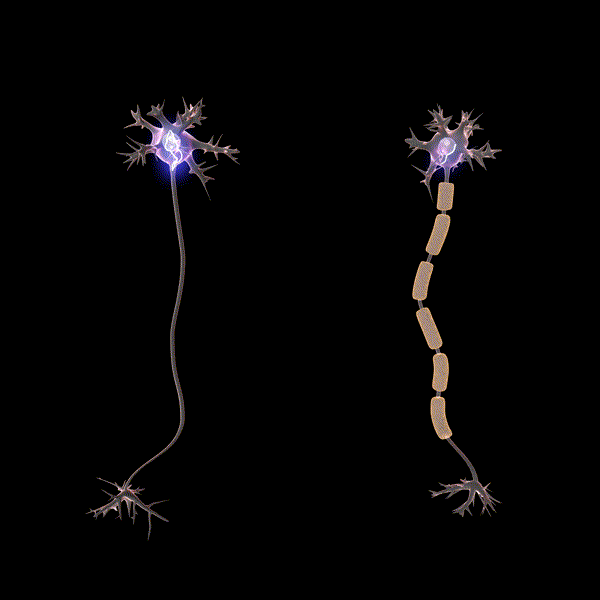Multiple Sclerosis: How ARMI’s Research Efforts are Paving the Way for New Treatments
Here at the Australian Regenerative Medicine Institute, we’re investigating the potential of regenerative medicine to treat, and hopefully, one day, reverse neurodegenerative diseases, such as Multiple Sclerosis.
Multiple Sclerosis (MS) affects more than 25,000 Australians and impacts more young people in the country than any other chronic progressive brain disease. With this troubling fact, it is likely that many of us will know someone affected by the debilitating disease in our lifetime. But what is MS exactly? MS is a disease of the brain, spinal cord and optic nerves, otherwise known as the central nervous system (CNS), and it impacts how cells in the CNS communicate to one another.
The breakdown of this critical communication process leads to symptoms such as loss of motor control, fatigue, continence problems, depression and memory loss. And while symptoms and how the disease progresses varies from person to person, most people affected by MS live near-normal life spans, but with a severely diminished quality of life. This means MS patients often require long-term, extensive and specialised care. The disease is not just tough on the patient, but also a considerable financial and emotional burden on families, friends and carers.
While we don’t fully understand what exactly causes MS, we do understand what happens during MS. For someone suffering from MS, their immune system attacks their CNS, which in turn sets off a process called inflammation. It is this inflammation that damages core components in the CNS that keep our nervous system healthy, called oligodendrocytes and myelin.
Oligodendrocytes are cells in the CNS that produce myelin; a fatty substance that surrounds a specific section of nerve cells called the axon. This myelin plays a critical role in making sure our nerve cells are functioning correctly. Nerve cells use electrical signals to send messages to each other and to other cells of the body. Every time your arm moves, your brain is sending electrical signals to the muscle cells in your arm, instructing it to move. Myelin, due to its fatty properties, help carry these electrical signals by acting as a conductor.

Electrical signals move faster through the axon of a neuron due to myelin. Credit: Docjana.com
In MS, the immune system attacks the oligodendrocytes, causing them to die. And without oligodendrocytes, myelin is not produced. And without myelin, the messages that your brain sends out would move very slowly, if at all. This upsets the delicate system of the brain and causes damage to nerve cell, leading to the symptoms that patients with MS experience. As such, there are two important aspects to MS: inflammation and oligodendrocyte cell death.
“At the moment, there is no cure for MS and current treatments, while they do slow disease progression, they only address inflammation…This is where our researchers come in.”
At the moment, there is no cure for MS and current treatments, while they do slow disease progression, they only address inflammation. These treatments do not reverse symptoms, are unable to undo the damage caused to oligodendrocytes, and there can be significant side effects. This is where our researchers come in.
At ARMI, the Merson group is studying the interactions between brain cells and oligodendrocytes. By unravelling this dynamic relationship, we will begin to understand how myelin is formed in a healthy brain and how this process is altered in a brain affected by MS. Unlocking these differences could hold the key to developing better drugs to restore myelin.
Not only that, but the Merson group also has the goal of understanding the significant mechanisms that cause damage to neurons when oligodendrocytes die. This knowledge could help us prevent or reverse the flow-on effects to neurons during MS. It is this complex and interconnected mix of questions that the Merson group is trying to answer, which may give rise to a new regimen for treating MS; one that could address all facets of the disease. And leading the way is Group Leader Dr Tobias Merson.
“My group’s work is focused on developing novel methods that promote the regeneration of myelin. This is vital in restoring nerve cell function and preventing further irreversible damage. If we can develop drugs to promote myelin repair, this will go a long way to improving the quality of life for patients with MS,” said Dr Merson.
Recent work by the Merson group and local and international collaborators has further defined the relationship between brain cell activity and the process of myelination. Published in the prestigious journal, Nature Communications, the study has demonstrated for the first time that the level of the electrical activity of each axon plays a major role in determining whether it will become myelinated. For this research, the Merson group used sophisticated genetic tools, powerful microscopes and important mouse models to understand this relationship.
“By delineating this relationship at this level, we can begin to unravel the unknowns of the brain. We can begin to understand how the processes in the healthy brain and in an unhealthy brain differ. We can pinpoint the major players in helping us shift an unhealthy brain into being a healthy one,” commented Dr Merson.
“If we can develop drugs to promote myelin repair, this will go a long way to improving the quality of life for patients with MS.” – Dr Tobias Merson
This work contributes to the development of therapies aimed at treating and even reversing the damage that occurs in neurodegenerative diseases. Ultimately, the goal of this research is to help people affected by MS.
More information
The Merson Group studies the cellular and molecular interactions between neurons and myelin-forming oligodendrocytes in the central nervous system. For more information on Dr Tobias Merson and his group at ARMI, please visit the Merson Group page. You can contact Dr Tobias Merson via tobias.merson@monash.edu or follow him on Twitter @About_Myelin.
